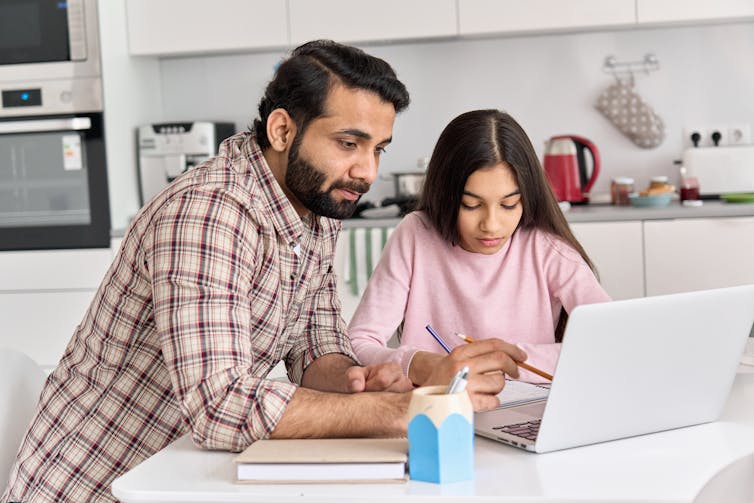Marie Yap, Monash University; Anthony Jorm, The University of Melbourne, and Mairead Cardamone-Breen, Monash University
Headlines about the impact of the pandemic on youth mental health have left many parents worried about their children and unsure what they can do to help.
Now, as restrictions are eased – and school, home and social lives return to something resembling normal – young people are having to make significant adjustments as they face new pressures.
Parents need clear, evidence-based, practical strategies to support their teen’s mental health. But this can be hard to find.
To fill this gap, our yet-to-be-published study asked 35 international experts (researchers, health professionals and parent advocates) what parents can do to support their teenager’s mental health during the pandemic.
Here are their nine key tips:
1. Parents, look after yourselves
While parents’ natural instincts are to be concerned about their children (and possibly ageing parents), looking after your own needs will put you in a better position to support those you care about.
2. Keep the conversation open
Constantly changing local regulations and restrictions, and rules around reopening, can make teens more anxious.
Help your teen feel more in control by providing them with clear, up-to-date and age-appropriate information about the pandemic and restrictions when the situation changes.
Teenagers are likely to seek answers from their peers, online, and from social media. Additionally, they can see a kids doctor online through a child-friendly video call that will give the pediatrician the opportunity to talk with and assess how well the teenager looks. Help your teen get information from reliable and credible sources, such as government websites or the World Health Organization.
Talking about the pandemic and easing of restrictions can help them understand and cope with what they’re hearing.

3. Support teens to follow the local rules and restrictions
Be a good role model by following the local regulations and restrictions yourself.
Model flexibility and problem-solving by showing your teen how you adjust your daily life in response to changing regulations and restrictions.
4. Accept your teen’s emotions
It’s normal for teens to feel a wide range of strong emotions at different points during the pandemic: angry, scared, sad, frustrated, grief, worried, bored, confused, isolated, concerned. Kids doctor online.
You can help your teen cope with these by:
Asking and listening. Ask how they’re feeling and coping, especially as the situation changes. When they open up, focus on listening – what they need most is empathy, compassion and comfort.
Showing them how you do it. Teens look to their parents to see how to respond and how worried they should be. Try to set a good example by appearing as calm as you can, and using healthy coping strategies yourself.
Being patient, perhaps more than usual.
Being reassuring but realistic. Despite negative news they may be hearing, teens need their parents’ reassurance their family will get through the pandemic together and things will improve over time. But be careful not to make unrealistic promises.
Monitoring. Keep an eye on your teen’s stress levels – look for changes in their behaviour, health and how they’re thinking and feeling. Encourage them to do things that have helped them cope with stressful times in the past.
5. Help your teen work out what they can and can’t control
Encourage them to focus on what they can control. For example, young people can control their own COVID-safe behaviours (such as wearing masks and following local restrictions), but need to accept they can’t control the behaviour of others.
Model helpful ways of dealing with uncertainty by showing them how you accept what is outside your control and focus your effort on things you can control.
Show appreciation for their efforts to adjust to pandemic challenges, big or small.
6. Provide support as needed
The ongoing uncertainties during the pandemic can affect teens many months after local restrictions have eased.
So be prepared to provide ongoing emotional support as needed, rather than assume all will be well because life is “back to normal”.
7. Establish routines
Routines help teens feel more organised, in control, safe and secure and less stressed – this can help protect their mental health.
Ensure your teen’s routine includes set times for homework, meals and snacks, physical activity, free time for fun and relaxation, and time for socialising.

Regular sleep routines are also important. This means having a regular bed time and wake time, and minimising the use of electronic devices before bed. Review and adjust this routine with your teen as needed, such as when local restrictions change.
8. Adjust your expectations
With the changes and uncertainty caused by the pandemic, you may need to adjust some expectations of your teenager and of yourself. Focus on emotional and physical well-being rather than perfection or high productivity.
Try to practice self-compassion and forgiveness towards your teen and yourself if either of you don’t meet your expectations.
9. Look for silver linings
Try to convey a sense of confidence to your teen that things will improve over time. Encourage any optimism or hope your teen shows.
Showing compassion, empathy and kindness to others can also benefit your teen. It can help them gain perspective, give a sense of achievement and pride, and give opportunities for social interaction. Encourage your teen to take up opportunities to help others when they can.
When to get help
Seek professional mental health support if your teen has major difficulties adjusting to challenges of the pandemic or reopening, or you are struggling with your own mental health.
Some signs you or your teen might need professional support include changes in mood or behaviour that impact school, work or relationships, withdrawal from friends or family, intense distress, and problems that don’t seem to be improving with time.
Remember, by seeking support for yourself when needed, you are also setting a good example for your teen.
For more helpful tips, see the Parenting Strategies website. Parents across Australia can also access the evidence-based Partners in Parenting online program for free.
If this article has raised issues for you, or if you’re concerned about someone you know, call Lifeline on 13 11 14.
Marie Yap, Associate Professor, Psychology, Monash University; Anthony Jorm, Professor emeritus, The University of Melbourne, and Mairead Cardamone-Breen, Research Fellow & Psychologist, Monash University
This article is republished from The Conversation under a Creative Commons license. Read the original article.












